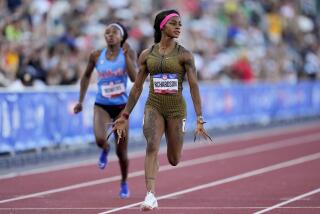Retests Said to Reveal Use of Stimulant
- Share via
Sprinter Calvin Harrison, a gold medalist in the relays at the Sydney Olympic Games, tested positive this summer for the stimulant modafinil, sources said Friday, adding that at least half a dozen U.S. athletes might have tested positive for the same stimulant.
The positive testing for modafinil showed up in a reexamination of data collected after the U.S. Anti-Doping Agency reviewed tests taken at the U.S. national track championships at Stanford in June and other summer meets after it learned of a new designer steroid, tetrahydrogestrinone, or THG.
The new modafinil cases were disclosed as the International Olympic Committee said it would test for THG at the 2004 Games in Athens in August. Modafinil was added a few weeks ago to the list of banned performance-enhancing substances.
Track’s worldwide governing body, the International Assn. of Athletics Federations, has said it plans to retest about 400 samples from the world championships in August in Paris for THG.
In announcing the discovery of THG last week, USADA’s chief executive, Terry Madden, said a re-check of samples taken over the summer had also uncovered positive tests for modafinil, prescribed by doctors to treat patients with narcolepsy, a sleeping disorder.
“What we have uncovered appears to be intentional doping of the worst sort,” he said then about the THG positive tests, adding he knew of no other case “larger than this involving the number of athletes involved.”
At the time, however, authorities knew of only five positive THG tests, four involving unidentified U.S. athletes and one involving Europe’s fastest sprinter, Dwain Chambers.
Chambers’ attorney acknowledged earlier this week that his client had tested positive.
The modafinil cases strengthen Madden’s claim. And sources said that although they knew of at least six positive modafinil cases, there could be more.
“Apparently, there’s an epidemic [among track athletes] of narcolepsy in the United States,” a wry Arne Ljungqvist, anti-doping chief for the IOC as well as the IAAF, said Friday, speaking from Sweden.
USADA has said it thinks the discovery and distribution of THG is tied to Bay Area Laboratory Co-Operative in Burlingame, Calif. BALCO is the focus of a federal grand jury in San Francisco.
The company’s founder, , Victor Conte, is widely known in track circles. He has denied wrongdoing.
The scope of the federal inquiry is unclear. Forty athletes have been subpoenaed to testify in the case. On the list are baseball sluggers Barry Bonds of the San Francisco Giants and Jason Giambi of the New York Yankees, as well as boxer Shane Mosley and track standouts Kelli White, a sprinter, and Kevin Toth, a shotputter. Those subpoenaed might have been summoned simply to provide information.
Modafinil and THG are not related. The former is a stimulant, and the latter is a muscle-building steroid.
White and hurdler Chris Phillips tested positive at the world championships for modafinil. She won the 100- and 200-meter sprints and stands to lose her gold medals. He finished sixth in the 100-meter hurdles.
Harrison did not return calls Friday to his North Carolina home. He is believed to have tested positive for modafinil at the U.S. championships at Stanford.
Harrison won gold in Paris as a member of the 1,600-meter relay team. In Sydney, he ran the third leg in the final round of the 1,600-meter. The U.S. team, anchored by sprint legend Michael Johnson, cruised to victory.
The 1,600-meter relay in Sydney has long been a focus of the IOC and IAAF. Sprinter Jerome Young, who ran in the preliminary and semifinal rounds for the U.S. team, tested positive in 1999 for the banned steroid nandrolone. He was cleared to compete at the 2000 Games, after a process conducted in secret by a USA Track & Field appeals panel.
The IOC and IAAF want an explanation. USATF has consistently declined to provide it, citing confidentiality concerns.
More to Read
Go beyond the scoreboard
Get the latest on L.A.'s teams in the daily Sports Report newsletter.
You may occasionally receive promotional content from the Los Angeles Times.






